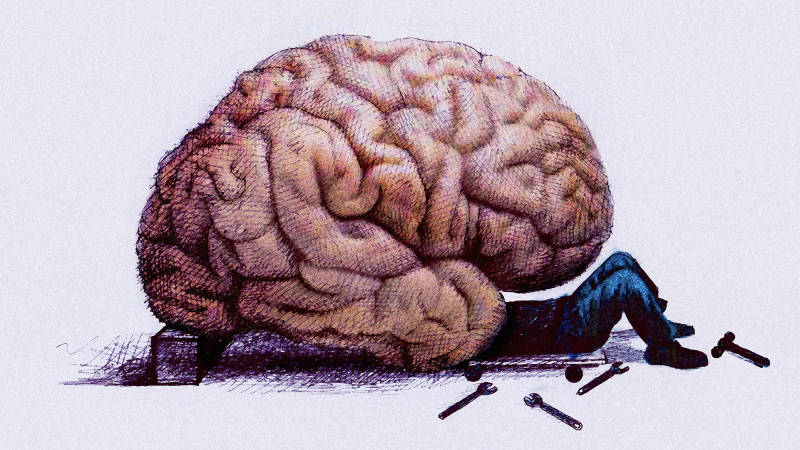"Your whole mind is allowed to speak to a specific part of your brain in a way you never imagined before. Then you get feedback that helps you discover how to turn that part of the brain up or down," says John Gabrieli, a neuroscientist at the Massachusetts Institute of Technology who was not involved with the work.
Using an fMRI for this kind of brain feedback is more effective than other, older tools like placing electrodes on the skull or EEG, Gabrieli says. "MRI lets you target a specific brain system or structure. EEG does not. When we're measuring electrical activity, we don't know really where it's coming from." He says he hasn't seen compelling evidence that EEG feedback, which is commercially available, has helped people change their behavior.
Two of the researchers, Kathryn Dickerson and Jeff MacInnes, tried the system out on themselves. Not everything worked. Dickerson said she tried thinking about different memories that left the feedback meter cold. "Zip lining was super fun, but [thinking about that] was just terrible and not effective at all."
So she switched strategies and tried giving herself a pep talk in the scanner. "I was like, 'Come on Katie. Move the thermometer. Just do it and move it.' And I just pumped myself up. That was very effective," she says. "It was exhilarating."
But it was also exhausting, MacInnes says. "The experience of the task was very difficult. You're being asked to generate these intense motivational states for 20 seconds over multiple periods. It was very fatiguing for people."
Study participants had a similar experience, Adcock says. Some people sang Queen songs to themselves or imagined having an angry coach yell at them. "My personal favorite was running down a line with everyone giving you high fives," Adcock says. When she took the feedback meter away, the participants were still able to light up their ventral tegmental area by thinking about the same things.
People really are changing their mood when they're doing this, Adcock thinks. They're really becoming more focused and eager. And it seems the effect begins reaching out to parts of the brain involved with learning and memory,
"We think that's exciting because it shows after this training, something changed, Dickerson says. "The brain isn't quite the same." She thinks people might be achieving a state of mind that's more conducive to learning and motivation.
If that's true, it would be extraordinarily useful, Gabrieli says. Using MRIs to exert control over certain parts of our brain has been done before, he says. "[But this] is the first study to show it can be applied to the most important brain structure for human motivation. That could be very valuable for things people want to accomplish in life."
Or it might be applied to habits that are really hard to start or break, Gabrieli says. "The hugely exciting piece of this is whether now people can use this upcoming research to gain control of behaviors that are challenging," he says. "Healthy habits, eating habits, stopping to smoke and can a person with addiction use this successfully?"
And it might someday be a clinical tool. For instance, this particular cluster of neurons in the midbrain is part of the dopamine system. Adcock thinks activating them in this way might also be releasing dopamine that could replace drug therapy for certain disorders.
"In ADHD, for example, we use stimulants that result in the same kind of release of brain chemicals," Adcock says. "Does this technique generate that same kind of release of dopamine that a stimulant does? If we teach people to use it successfully, we could impact attention."
But nobody knows if this actually changes brain chemistry. MacInnes says there are more experiments and tests they need to see if the brain activation they're seeing actually does release dopamine or other neurochemicals.
Even if it does, Adcock says it's definitely not affecting neurochemicals as much as a medication like Adderall, which is used to treat ADHD.
And Adcock didn't study if anyone actually changed their behavior after the sessions in the MRI yet.
After the study, people have been trying the same strategies to motivate themselves in their daily lives, according to Adcock. If it's working, brain training in an MRI might be a way for us to tap into our mind's circuitry for willpower.
That, Gabrieli says, would be terrific.
Copyright 2016 NPR. To see more, visit http://www.npr.org/.
9(MDAxOTAwOTE4MDEyMTkxMDAzNjczZDljZA004))

9(MDAxOTAwOTE4MDEyMTkxMDAzNjczZDljZA004))